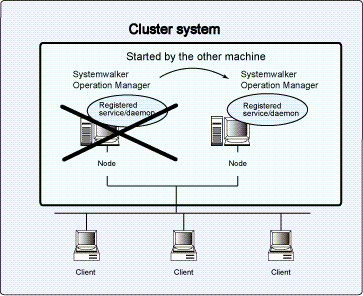Systemwalker Operation Manager can support the following cluster systems:
Operating System | Cluster |
|---|---|
Solaris | PRIMECLUSTER |
Linux | PRIMECLUSTER |
HP-UX | MC/ServiceGuard |
AIX | HACMP |
Refer to the Systemwalker Operation Manager Technical Guide for details on the version levels.
The following figure shows a schematic representation of Systemwalker Operation Manager operation with cluster system.

The terminology for describing nodes and processes in cluster system varies from cluster system to cluster system. However, the descriptions in this manual use the following terms:
This is the node where jobs normally run.
This node is on standby to take over jobs when the active node fails.
This refers to the transfer of jobs from the active node to the standby node when errors occur.
This is the disk that is shared between the active node and the standby node.
This is the virtual IP address used by the cluster system and is common to both the active node and standby node.
This is the IP address specific to each node.
However, the terminology of relevant cluster system is also used to describe windows, and in other cases where the use of such terminology makes explanation easier to understand.
Daemons that can be registered with cluster system
The following Systemwalker Operation Manager daemons can be registered as resources with cluster system:
Jobscheduler (including the Master Schedule Management function)
Job Execution Control
Information that can be automatically reflected in the cluster system
The following information can be automatically reflected in both the active node and the standby node of the cluster system:
Security information
Calendar information
Day change time
Calendar holiday information
Schedule information, power schedule information and completion monitoring information for the SYSTEM_CALENDAR
Service/application startup information
Application startup information
Settings can also be made so that "schedule information, power schedule information and completion monitoring information for SYSTEM_CALENDAR" under "Calendar information" and "Application startup information" under "Service/application startup information" are not reflected automatically.
Failover trigger
Failover takes place when an error occurs in the resources registered with the cluster systems.